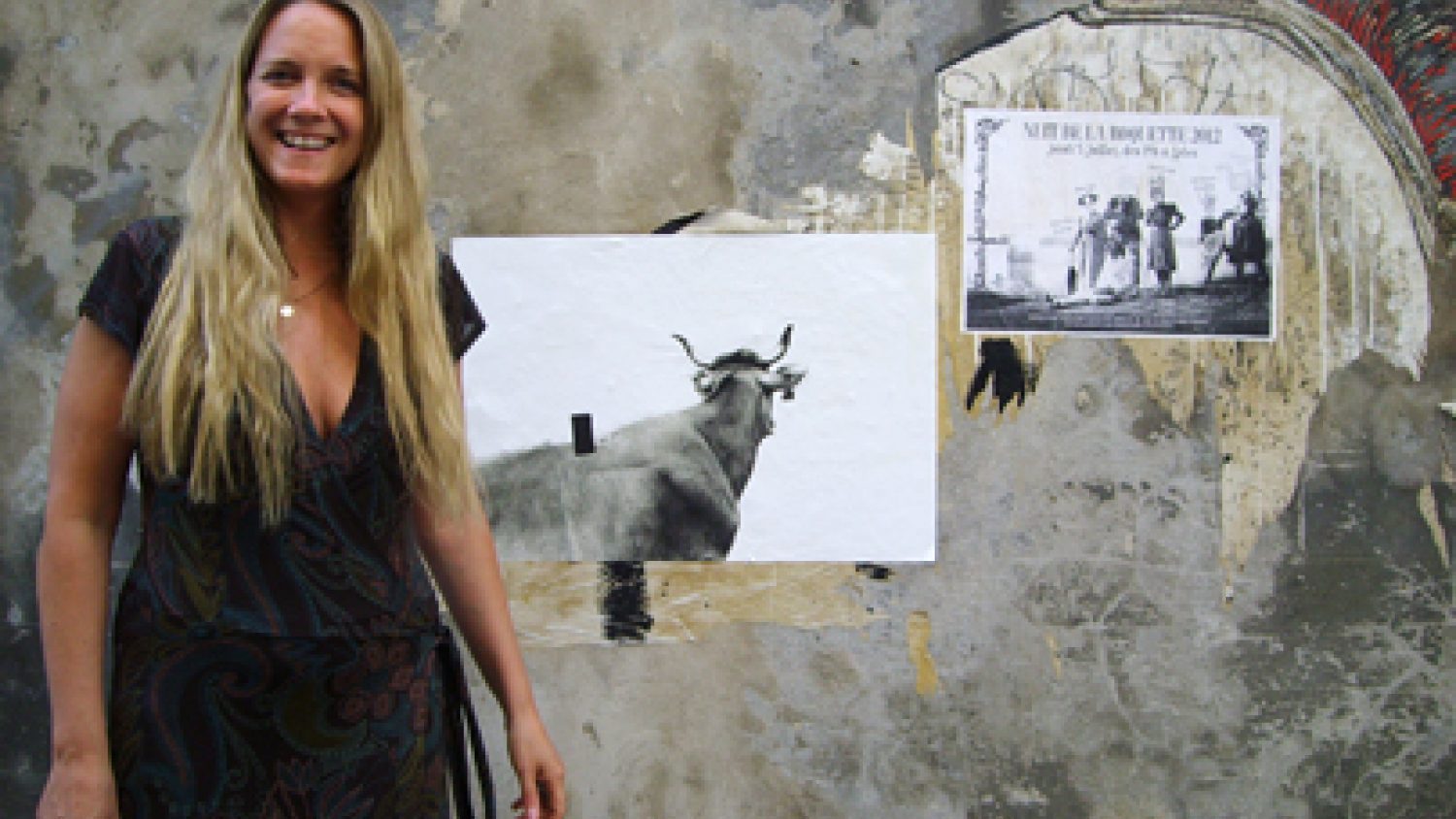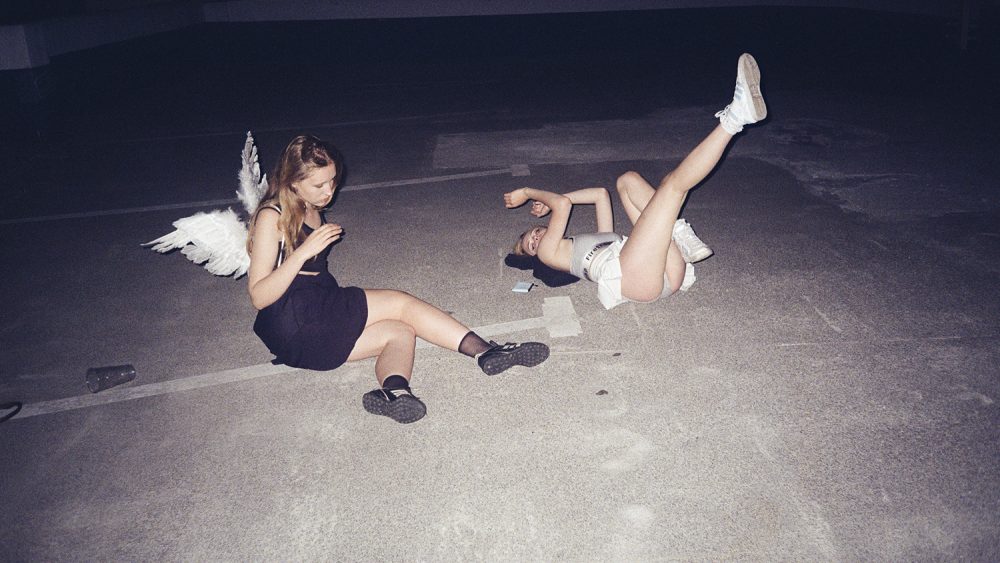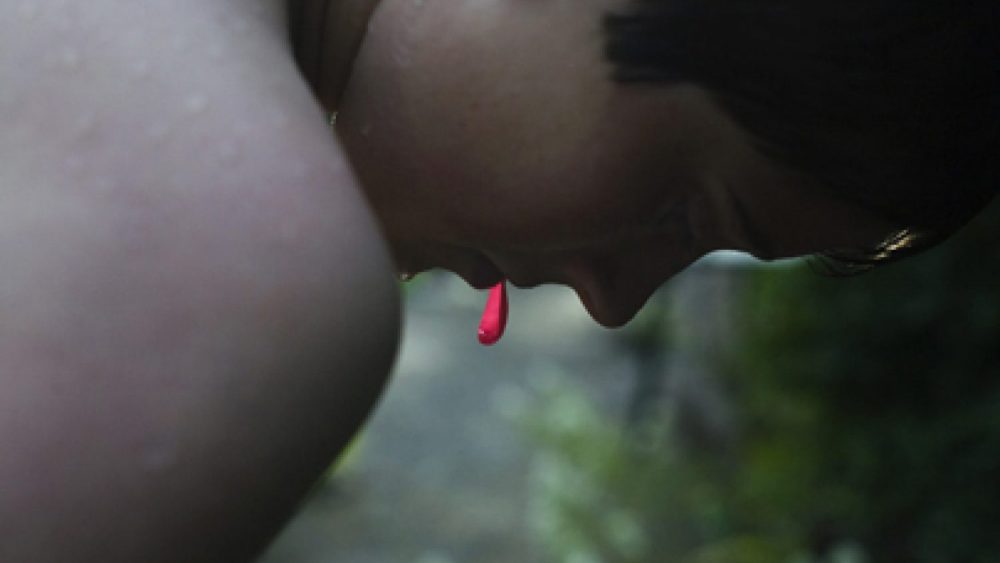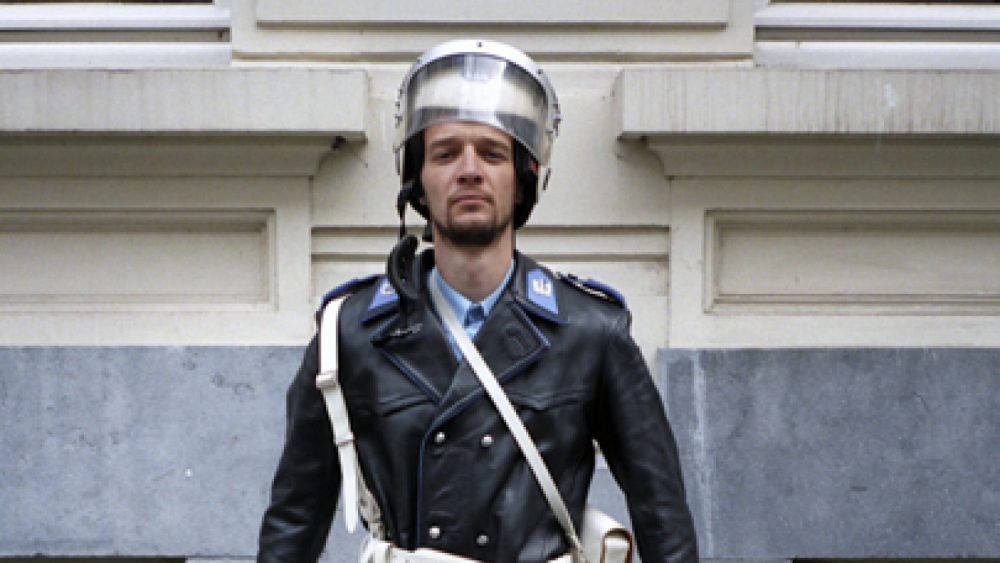Interview with Jessica Backhaus
German photographer Jessica Backhaus (1970), whom I met this summer in Arles, reveals herself in a personal interview in the summer scent characteristic to the heat of Southern France. She tells about the choice of occupation, her friendship with French photographer of German origin Gisèle Freund, to whom she has dedicated series One Day in November, as well as about her feminine approach to details and sources of inspiration.
Jessica Backhaus is regarded as one of the most distinguished voices in contemporary photography in Germany today. Her work has been shown in numerous solo and group exhibitions, including the National Portrait Gallery, London, and the Martin-Gropius-Bau, Berlin. To date, she has six publications to her name, her photographs are in many prominent art collections including Art Collection Deutsche Börse, Germany, ING Art Collection, Belgium, Collection of the Museum of Fine Arts, Houston, USA and the Margulies Collection, Miami, USA.
How did your love story for photography start?
It’s a beautiful way to say it because in a way it is really a love story, especially for people in artistic, creative professions. For me it started quite early because I grew up with parents who are artists – my mother is an actress and my father is a theatre director. I was basically born in the theatre and we were always travelling a lot, depending on where they had a job, from theatre to theatre all over Germany. We were like gypsies. But, of course, it was very exciting and colourful childhood because I was always surrounded by actors and artists. The way my parents brought me up was very much like an open house, they were always very welcoming. It was an unconventional childhood. I believe that it was the beginning of the spark where I got interested in photography. I was always observing, I was watching at the back, in the dark while doing my homework and then I got side-tracked and I watched them. After a while, I developed that sense of witnessing. My parents divorced and I moved with my mother to Berlin when I was 12. She fell in love with a woman who at the time had a film and movie archive, so during my teenage years I was spending hours and days in that archive, I was obsessed. When I was 16, I realized that I have developed a passion for an image, so that was in those years that my love for photography was born.
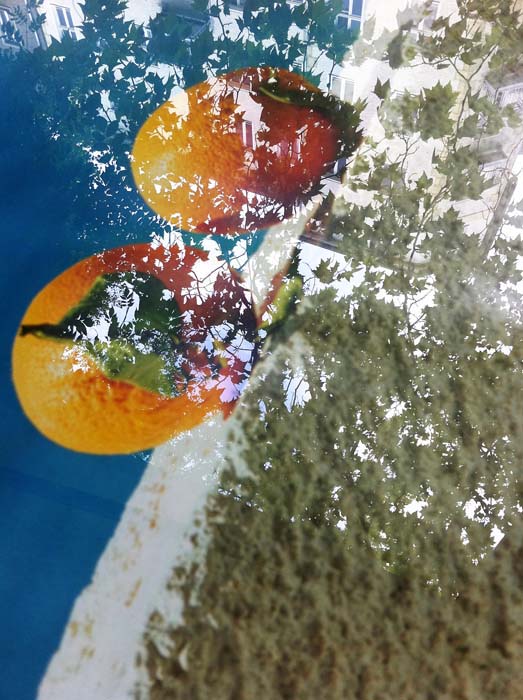
Have you ever tried theatre?
That’s another good question. The truth is, I’m very shy. I had to learn over the past 10 years how to do a lecture or a workshop. And still, every day, I have to overcome my fear to talk in public. Even though I love the profession of acting, I was so close to it but in the end I decided I’m better off in the background. I prefer to be behind the camera.
How would you describe your photography?
I think my work is very intuitive, it goes along with my own emotions and feelings. In a lot of ways, even if they are my emotions, I’m surprised that in the end, if I’m lucky, a lot of people feel certain emotions. You express yourself because there is not another way you can do it. I think it’s lyrical, very poetic. It’s not very narrative or documentarian, it’s real and very raw, nothing is staged in my work. I love seeing things as they are. When people are touched and moved by my work, it’s always the biggest compliment. What I’m hoping to achieve, is to move people. My work is very quiet; I’m not interested in screaming and creating scandals. It’s about the little things and details which I think tell a lot about a bigger picture. You can sometimes read so much more between the lines.
It’s beautiful to convey your feelings to others and make them universal. Do you think that the sense of beauty is also universal?
It’s so subjective. One thing is clear, I’m not afraid of the beauty and I need it in my life. But then, what is beauty? It really depends on the person, it’s so personal what one individual finds beautiful. People also say that my subject matter is so banal and uninteresting but I find it beautiful. It’s less obvious, I like when it’s not too easy.

I have noticed a lot of times that people leave an exhibition with a comment: “Why can’t artists create something beautiful instead of making depressive work?”…
People want to feel secure. If they don’t understand the work, they get worried. They are loosing their tracks. For a lot of people who don’t understand, they almost dismiss it. People want to know everything, they analyse everything. You have to live, to give some freedom to your work, in my opinion. I don’t think you can explain everything – weather you feel it or not. I don’t want to be put in a box, I want to be free.
Do you have any work rituals, routine?
It depends. This winter, for example, a museum gave me a commission to do a work for them, to create a work about the creation in the studio and in the kitchen. I was absolutely free to create any kind of work I wanted. I thought at the beginning that it could be dangerous – those two territories were at the slippery slope, a result can become very commercial. So I thought to give it a try, as it was a challenge. For that particular commission I had a schedule, not really a routine but for a few months I was in a complete bubble, shooting all the time. I usually work on a long term projects, like for three, four years. It’s a good thing because you need a distance towards your own work, you need to see what you’re working on, what is missing, it’s almost like a puzzle. With time we develop a distance and I enjoy that rhythm. There are weeks when I feel inspired and I work all the time but then there are moments when I barely photograph because I can’t see or don’t feel. I sometimes need not to do. I need energy, a new critical eye to re-approach the subject matter.
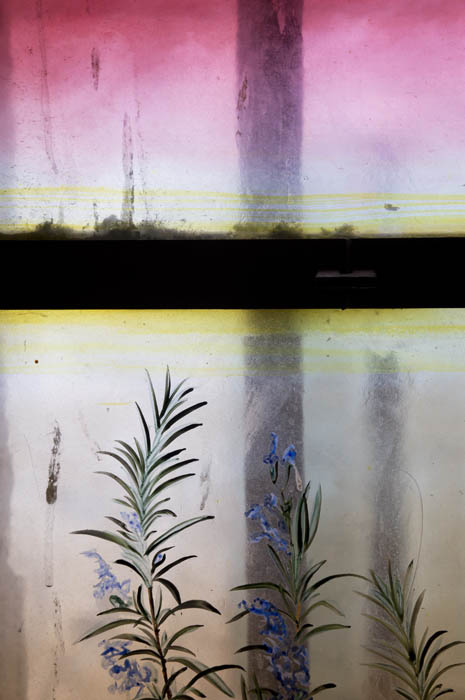
What are you working on now?
It’s a project I started when I was still living in New York. The main subject matter is the phenomenon of time. It’s called Once, Still and Forever and it’s dealing with the past but also starting a new chapter after 22 years of not being in my country. It’s not a chronology, nor a documentary project. Again, you see my New York and my Berlin through the still lives and my feelings. It also deals with that fascinating feeling that certain things happen just once but some of them will always stay. It’s about the different feelings we have within a course of lifetime and I’m dealing with all this because of this radical break I had three years ago in my life. I was completely switching the continents, switching my personal life, there were a lot of things going on I was trying to find answers for, trying to comprehend. Sometimes you have to go away in order to come back.
Is it possible to describe the things that inspire you?
Life inspires me! It’s our life, our emotions, our feelings. It’s interesting because my gallery in Boston just asked the same question within a questionnaire they gave to all the represented artists. It is moments and certain situations that I’m moved by and thus they inspire me. It can be an encounter with a human being, it can be a magical exhibition; I’m quite obsessed with the movies, their dialogues can inspire me, or a conversation on the street, and the architecture, a house and its atmosphere…
What is the most rewarding thing for you from photography?
In a way, it’s to be able to live in freedom. I feel privileged to do something I have the passion for. If you’re lucky, you have a possibility to show and publish your work, and if you can move people too, it is a real gift. Through photography, I get to see the world and enter places that I wouldn’t have a chance to if I had a 9 to 5 office job. I had a chance to integrate into a Polish community, to see how the farmers live, or being able to enter the worlds of chefs’ kitchens. I find it incredible how it opens your horizon, you get to witness so many places and people. My mother said: “When you do an artistic work you have to be so sensitive and vulnerable to feel something, to allow something to happen and at the same time you have to have an elephant’s skin because it’s also brutal.” It’s more than people think it is, it’s not a fairy tale, it’s a hard work. You have to really be dedicated in every aspect. Things don’t just fall from the sky. But it’s a way of living, it’s my life I chose to live.
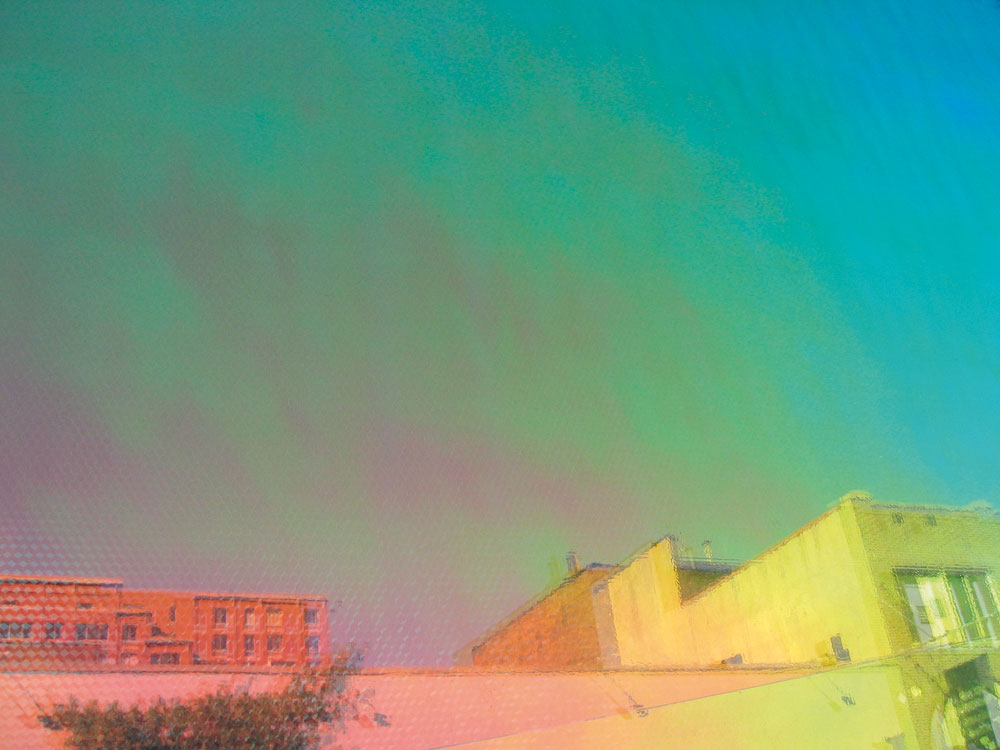
You have spent some time with Gisèle Freund. What was your relationship like?
She became everything to me – a friend, a teacher, a mentor… When I was 19, during my studies in Paris, we had to read Photographie et société, I read it and I was intrigued because I had no idea who Gisèle Freund was. So, I did the research and I learned about her legacy and how important figure in photography she was. I was also very moved about her work, I found it sincere and dedicated. I thought in an idealistic way how nice would that be to meet her. It turned out that on the 5th of November, 1992 I got very lucky! In Paris, there was a month of photography, there were many exhibitions and events; one night there was a symposium about the subject matter – copyright. Gisèle was there and I realized that if I ever was to meet her, this was the night. It was one of those “now or never” feelings. I didn’t know though how to approach her – there were, of course, many people who wanted to talk to her. And then, there was a moment when she was standing next to me, interviewed by an American journalist. When they stopped, I thought I would say a few sentences which came out very banal, she acknowledged it and couldn’t care less. So, I thought that it was my moment. I kept staying there, listening to her interview when suddenly Gisèle turned around saying: “Did you hear how this young woman speaks perfect French?” Then she stopped the interview and started talking to me; we had a little small talk and out of nowhere, she pulled out from her jacket a piece of cardboard with her telephone number written on it and added: “Why don’t you call me? We will have tea at my place!” I was so in shock. When I went to her house, we spent a whole afternoon together. It was the most amazing encounter, she was so curious about my life, I was, of course, very curious about her magical biography. We were simply connected, it was a beginning of a beautiful friendship up until she died in 2000. She was 84 when I met her, but we did so many things together – we went to exhibitions and movies, I introduced her to my friends, I cooked for her… Our friendship was one of the most beautiful gifts I’ve got in my life. Even though we had such a huge age difference, there was a deep understanding, connection and love. We inspired each other. She not only influenced me within my work but also the whole philosophy about the life and art. Another thing I learned from her was courage to live your life and follow your convictions, to do something without compromises.
Do you also teach?
As I told you, I’m shy but I’ve been asked a lot. I’ve done lectures and workshops and a few years ago I was asked to replace a professor for a year at Stuttgart’s Art Academy. I was encouraged to take the place. I worked with students on their projects, helping and guiding them, so it was finally a beautiful experience, although I don’t see myself as a teacher. When you get a generous feedback, the decision doesn’t feel wrong anymore even though I’m still wondering what I can teach them.

Would you try again?
I’m not pursuing it at all. I learned a lot with the students but as much as I enjoyed, at the end I must admit, I was completely wiped out. If you agree to do something, you should do your best. I didn’t have time for my own work, I was too emerged into their work.
What are your latest discoveries in photography?
It’s not a recent work but I would choose The Mother of All Journeys by a Chinese photographer Dinu Li. He did a beautiful project, going with his mother back to the past, to all the places that had any significance to his mother, documented it. It is an intimate and moving project.
